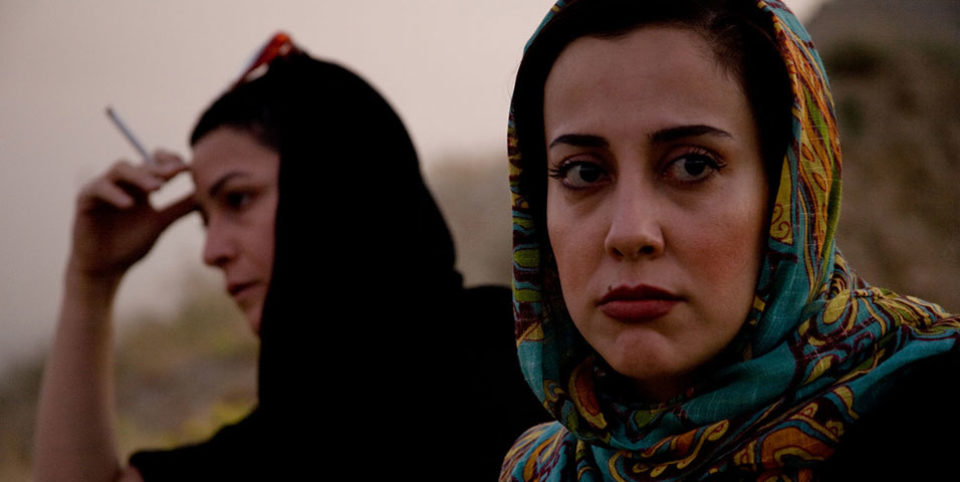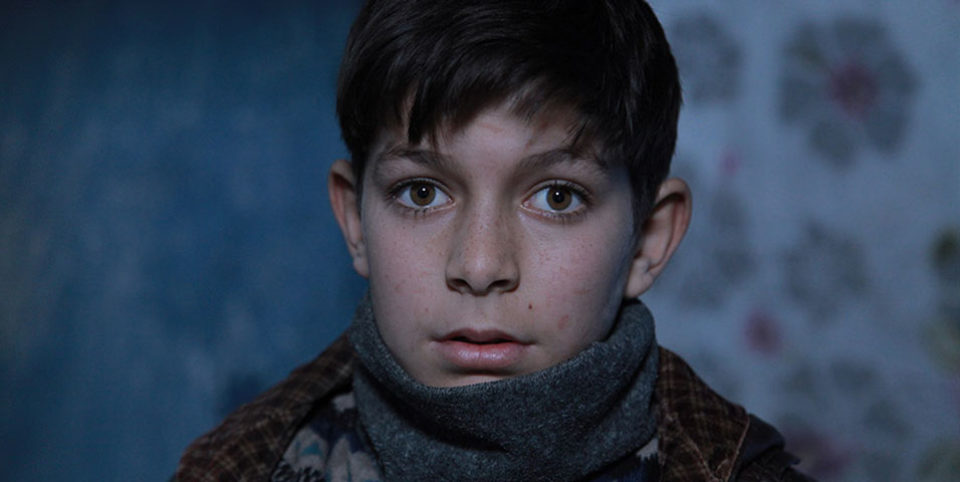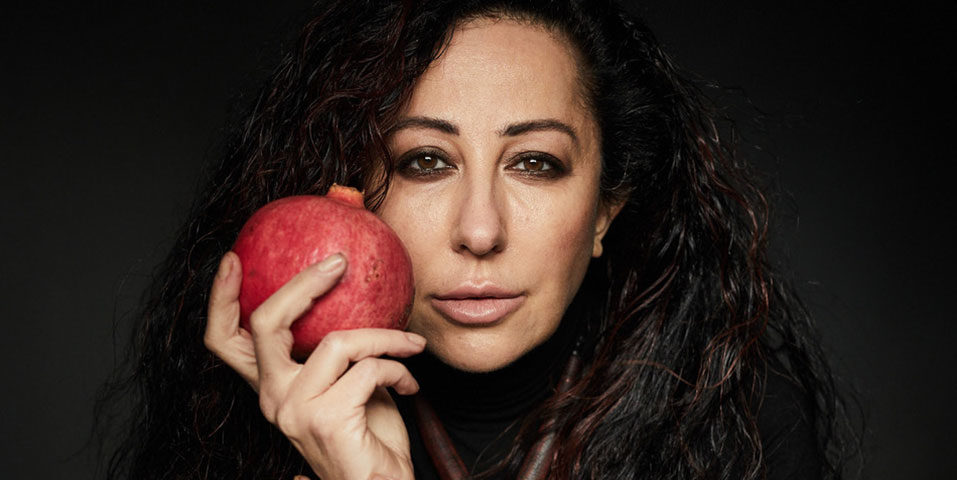Granaz Moussavi is a poet, writer, filmmaker and AFTRS alum (Graduate Diploma in Editing, 2005) whose works include internationally-acclaimed drama My Tehran for Sale (2009), and latest feature, When Pomegranates Howl, Australia’s official submission for Best International Film at the 2022 Academy Awards. Speaking to AFTRS’ Alumni Program Manager Christine Kirkwood, Moussavi reflects on finding her voice and translating poetry into film.
Christine Kirkwood: What made you want to become a filmmaker?
Granaz Moussavi: I grew up in a creative family – my father was a soundie for the main television studio in Iran and also worked on films. My mother was a colour grader at the same studio. So since I was small I was around film and television production. As soon as I was old enough, I would visit the TV station studios with my parents, sometimes I was even an extra on set. I became very comfortable on set or in edit suites with my parents and their colleagues. This was unusual in a time where everyone was expected to become a doctor or an engineer. I don’t remember when I decided I wanted to be a filmmaker – it was just a natural part of growing up. I was 16 when I had my first part in a film my father made. When I came to Australia at the age of 21 I was focused on acting as that’s what I trained in. But acting gave way to filmmaking as I wanted to learn more about that side once I arrived here.
CK: So, the world of film and television was a comfortable environment for you from day one?
GM: Yes and also because we watched a lot of films at home and at the cinema. What was available at the cinema was limited because of censorship, so we relied upon ‘filmies’ – young men who rented VHS tapes on the black market. They would come around door-to-door with long lists of American and European films we could choose from. We would rent films from them and then they’d come and collect them from our door when we were finished. Sometimes they’d disappear for weeks at a time if they got caught but they’d always resurface again. We watched good Iranian films at the cinema and they screened some of the classics like Charlie Chaplin films, Tarkovsky, Parajanov, and Spaghetti Westerns. Basically, anything that wasn’t violent or overtly sexual would be screened. Some of the films that surprisingly made to Tehran cinemas included Seven, Bowling For Columbine, The 400 Blows, and the films of Werner Hertzog.
In regards to censorship, the government is harsh but people are also powerful and resilient more than you think. They reshape and reframe history around the world. Iranian people are very good at tackling obstacles. Sometimes censorship takes you two steps forward, one step back, but we eventually get there.
CK: You have a background in poetry, do you see your filmmaking as visual poetry?
GM: I think so. My mind is trained as a poet, that’s been a long-term conscious body of work for me. I had great mentors when I was younger. I had tunnel vision, focusing on my work. I took on advice from my mentors and shaped my life into my creative practice. Not the other way around. I like films with a touch of poeticity to them. My doctorate thesis was on the ‘Aesthetics of Iranian Poetic Cinema’ so for a long time I was really thinking about the crossover between poetry and cinema and I think that comes across in my films.
CK: Do you think being a poet in Iran is a more common artistic pursuit than it is in Australia?
GM: Possibly, but the syndrome of fading poetry is becoming global. There is a niche audience in every country for poetry though. In Iran it’s part of the psyche or identity of the people. It captures people’s hopes and fears and is sometimes a narration of history. Poetry has been a strong conveyor of meaning and survival and people rely on poetry to express their pain and hopes. It is the counterpoint to politics. It goes in parallel with the history that is written by those in power. As censorship becomes more sophisticated so too does poetry in response. Even though we can trace back some of the great Iranian poets more than a thousand years it is still fading away.
CK: How do you think immigrating to Australia has changed your worldview?
GM: In many ways. Geography and language are important parts of your life. Living in the natural environment of a language opens another world. In my case, it was more of a reunion with family already living here. I didn’t go through the same pain as other immigrants might. For my family, it was easier as our relatives facilitated many parts of it for us.
I came here in a critical time of my life, in my early 20s. I had been working at a literary magazine in Iran and teaching literature and languages. In Australia, I had to take up kitchen work and waitressing which was very different for me. I was studying [at Flinders University] at the same time. This experience made me more independent and gave me the ability to travel around Australia and backpack around other countries. I experienced homesickness and it took me a long time to feel like an Australian citizen. On paper, it took two years, but it was sometime later that I truly felt Australian within myself. When you are living somewhere and you are not confident to be part of the conversation you don’t have the agency to have a say. That process is silently painful. It takes time to build confidence, find your voice and feel like you belong.
CK: Your debut feature film My Tehran For Sale is a brooding poetic look at modern life in Tehran. With the simmering tensions felt internally by the female protagonist being matched by the external landscape evolving around her. Was that film autobiographical at all?
GM: It had strong autobiographical elements in it. I wrote about my own experiences and those of people I knew. It came from stories I collected for a long time. I formed a patchwork of ideas and stories, cinematic expressions and poetry. The film was a practical part of my doctorate. I had a lot of content to put into one film. The conscious idea behind it was not to have something that was a linear narrative, but to relay the instability of the circumstances. It reflected the lives of underground creative people, and their urges to leave their country and also what makes them return to their roots. Pain causes a vicious circle of being unsettled. But this is my story too. At that time I was swinging between two identities. I had just published my first book of poetry underground in Iran and left for Australia. I was a patchwork in my head and in my soul and I reflected that in the film.

CK: Upon its release, the film was banned and lead actor Marzieh Vafamehr was jailed, and you have not been able to publish poetry in Iran since. Why was there such a stir around it?
GM: The film was and still is banned. The timing coincided with the Green Movement in Iran so the environment it was released into was brutal. There was no time for understanding or giving the benefit of the doubt. There was a lot of misunderstanding and harsh judgements for creatives at that time. There were a lot of livelihoods compromised including mine. It took a long time to heal from that. I was also trying to set up a new life in Australia. With the pain of being misunderstood and punished and separating from my country, I had to lock the experiences up in my mind. My life direction changed and I threw myself into work. I did some film editing but I also worked in detention centres around Australia and offshore as an interpreter. It became a prolific time of writing poetry and also I began writing When Pomegranates Howl.
CK: Have things changed for filmmakers in Iran since then?
GM: It’s difficult for me to judge. From afar what I see is that the measures of censorship have been tightened, but on the other hand, in some cases, are now looser in terms of how women are portrayed. Censors are more concerned with anything that invites the audience to think critically as opposed to big entertaining blockbusters. Censorship has loosened for films that allow escapism. More hair and make-up, suggestive dialogue, which is trivial, although better than nothing. It appears that as long as there’s no political messaging a lot of things will be allowed. However, I can see filmmakers who don’t have permits managing to make films and get them out. It’s a complex mechanism. I don’t really understand how the measures are so prohibiting on the one hand, but on the other hand, films are made without permits and keep on glowing in international festivals and markets which is a blessing, but hard for me to understand from afar.
CK: What are you most proud of in regards to your new film When Pomegranates Howl?
GM: There’s more than a decade between my first and second films, and I’m now a more experienced person. I’ve seen more films, I think more about cinematic language, I’ve done more self-training. I’m hoping this film is a much better film, in that the script is more carefully put together. Also, I worked with non-actors which was a new experience for me. I had not been to Afghanistan before. I had to find my place in that country in order to tell the story. I cherish the painful and joyful journey that I had to go through to make it. It’s been a journey for me personally from My Tehran For Sale to When Pomegranates Howl. Perhaps my critical lens has changed and I have more agency now. This film is a cinematic interpretation of my identity journey between the films. Once I felt like I belonged in Australia then I felt I could also be critical.
CK: Sydney Film Festival provided the first opportunity for you to see the film on the big screen, was that because of the pandemic?
GM: Yes, post-production took place at APG in Adelaide but I couldn’t get there. By the time I got there, I only had time to see it in the studio, there was no time to hire a theatre. MIFF was cancelled, otherwise, I would have seen it there. Though I lost the first 20 minutes at Sydney Film Festival due to press pictures being taken backstage. The first time I saw it fully was at Randwick Ritz.
CK: How did that feel?
GM: It was very heart-warming. I was surrounded by lots of people I knew, fellow classmates from AFTRS and UNSW, I felt like I had moral support around me. So far I have had very kind and supportive feedback here and overseas as well, which has been wonderful.

CK: How does being an editor shape the way you make a film?
GM: The editor mentality is the logical side of filmmaking. As a writer/director, there’s a lot of emotion involved. I have the ability to stray – especially with my background as a poet – into that world and get distracted. But my editing training keeps me grounded and logical. It’s a great tool to have, especially when guerrilla filmmaking. You can see the final result in your head which is so helpful. Then in post, I can relay my ideas quicker and understand what the editor is saying.
Studying editing at AFTRS was a wonderful experience. I was rejected the first time, but the second time I applied I was accepted. It was amazing, the facilities, the lecturers, the accommodation, the library, even the canteen was a great environment to learn in. I met so many great colleagues and had such strong support. I was critical at times, asking why we aren’t taking more risks in the film making, the world is so focused on box office return. But film schools are places to take risks and learn and grow.
CK: What advice do you have for aspiring filmmakers and AFTRS students in terms of finding their voice through their craft?
GM: While studying, keep on questioning. Don’t become complacent. Acknowledge the benefits of living in Australia and also the tyranny of distance. But don’t get used to the safety and security of this country, take risks. Stay critical, don’t lose your edge. Raise your voice in a peaceful, constructive way. Don’t forget the rest of the world. This is your opportunity to make your early films, early career moves. Use the opportunity wisely and don’t conform, or feel forced to follow the same model as everyone else – the three-act product designed to sell.
